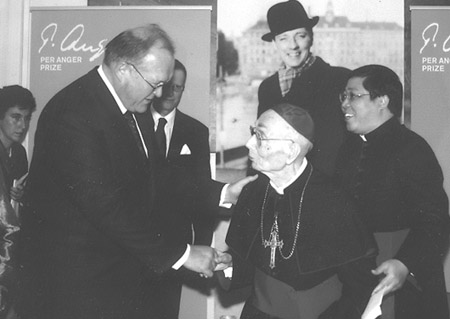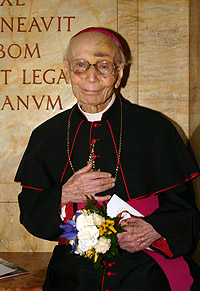Born in Acerra, Italy, his mother's native village, on November 3, 1906, he received his education at Acerra's Diocesan Seminary and later at the Faculty of Theology of the Jesuit Fathers at Naples. He was ordained to the priesthood at the age of 22, by Monsignor Francesco De Pietro, Bishop of the Diocese of Acerra, inside his private chapel, on December 23, 1928.
Verolino was sent to Rome, where he underwent further studies at the Pontifical Roman Athenaeum of San Apollinare, obtaining a degree in utroque iure. Entering the diplomatic service of the Holy See, he was named secretary of the Apostolic Nunciature in Hungary.
In 1944, Hungary - which, despite severe racial legislation, had up until then offered a relatively secure refuge to the Jews escaping from Poland and Slovakia - was little by little occupied by German troops and became one of the countries where the murderous Nazi persecution raged most fiercely. Verolino was there, as secretary of the Nunciature directed by Monsignor Angelo Rotta, and, along with the diplomats of the then neutral countries, worked to rescue as many Jews as possible from the journey that would have taken them to die in Auschwitz or in Austria. In those months of Nazi occupation, the Nunciature drew up and distributed to Jews between 25 and 30 thousand "Letters of Protection", with which it was possible to evade deportation. Verolino became the counterpart of the deputy of the Swedish Embassy and was in a position of close collaboration with Per Anger, the attaché at that time. Soon after, Raoul Wallenberg arrived. Verolino had the complete cooperation of the Papal Nuncio and full assessment from Pius XII himself, and they all stayed in Budapest, despite the war and the siege of the city, to help rescue as many lives as possible.
The named Pope Pius XII appointed him Apostolic Nuncio to El Salvador and Guatemala on September 5, 1951. Verolino received his episcopal consecration with the Titular Archbishopric See of Corinthus on October 7, from Cardinal Clemente Micara. Aged 50, he was named Apostolic Nuncio to Costa Rica on February 25, 1957. In 1963, he was secretary of the Congregation of Ceremonies and later official of the Secretariat of State in 1967. He retired at the age of 79 in 1986.
Monsignor Gennaro Verolino already 98 years old with the disarming limpidity of his kindly look, a whole life passed in the Secretariat of State, from minutes writer to nuncio, was well enough to recount his story, in which he was the actor without ever seeking the stage, solely through carrying out his duty as a Christian.
The Government of Stockholm conferred on Monsignor Verolino the "Per Anger" Award, named after the brave Swedish Ambassador resident in Budapest in those years. Monsignor Verolino opened up his Rome house and his memories on January 26, 2005, the day before the Day of Remembrance, on the sixtieth anniversary of the entry of the Red Army troops into Auschwitz.
Cardinal Angelo Sodano wrote a personal note to thank Monsignor Verolino once again. In Nazareth there is a school run by Franciscan Friars where the 749 little students wrote a letter of thanks to Monsignor Gennaro, who donated to them the entire sum of money from the prize awarded to him last October by the Swedish Government. At the Award Ceremony, two Hungarian Jews who had survived thanks to him were also present, one of them named Giorgy, the lad who accompanied him during the journeys with the lorry to pull those already destined for the annihilation camps off the train. When they came forward, with tears of gratitude, Monsignor didn't say anything, but made the sign of the cross and patted them.
On the first of October 2004, Monsignor Gennaro Verolino was awarded the First Per Anger Humanitarian Prize in Rome. It was presented by Mrs. Elena Anger, the widow of Per Anger and the Swedish Prime Minister, Göran Persson. Present as well was Cardinal Angelo Sodano, Secretary of the State of the Vatican, who conveyed the greetings of His Holiness, the Pope. The RWIMH was represented by its President, Dr. Vera Parnes. The award consisted of a trophy in the shape of a human heart and 200,000 Swedish Kronen. Verolino donated the award money to a children's home in Nazareth.
He passed away shortly after his 99th birthday, on November 17, 2005 in Rome and was interred in the Bishops' Chapel inside the Cemetery of Acerra.
Born in Acerra, Italy, his mother's native village, on November 3, 1906, he received his education at Acerra's Diocesan Seminary and later at the Faculty of Theology of the Jesuit Fathers at Naples. He was ordained to the priesthood at the age of 22, by Monsignor Francesco De Pietro, Bishop of the Diocese of Acerra, inside his private chapel, on December 23, 1928.
Verolino was sent to Rome, where he underwent further studies at the Pontifical Roman Athenaeum of San Apollinare, obtaining a degree in utroque iure. Entering the diplomatic service of the Holy See, he was named secretary of the Apostolic Nunciature in Hungary.
In 1944, Hungary - which, despite severe racial legislation, had up until then offered a relatively secure refuge to the Jews escaping from Poland and Slovakia - was little by little occupied by German troops and became one of the countries where the murderous Nazi persecution raged most fiercely. Verolino was there, as secretary of the Nunciature directed by Monsignor Angelo Rotta, and, along with the diplomats of the then neutral countries, worked to rescue as many Jews as possible from the journey that would have taken them to die in Auschwitz or in Austria. In those months of Nazi occupation, the Nunciature drew up and distributed to Jews between 25 and 30 thousand "Letters of Protection", with which it was possible to evade deportation. Verolino became the counterpart of the deputy of the Swedish Embassy and was in a position of close collaboration with Per Anger, the attaché at that time. Soon after, Raoul Wallenberg arrived. Verolino had the complete cooperation of the Papal Nuncio and full assessment from Pius XII himself, and they all stayed in Budapest, despite the war and the siege of the city, to help rescue as many lives as possible.
The named Pope Pius XII appointed him Apostolic Nuncio to El Salvador and Guatemala on September 5, 1951. Verolino received his episcopal consecration with the Titular Archbishopric See of Corinthus on October 7, from Cardinal Clemente Micara. Aged 50, he was named Apostolic Nuncio to Costa Rica on February 25, 1957. In 1963, he was secretary of the Congregation of Ceremonies and later official of the Secretariat of State in 1967. He retired at the age of 79 in 1986.
Monsignor Gennaro Verolino already 98 years old with the disarming limpidity of his kindly look, a whole life passed in the Secretariat of State, from minutes writer to nuncio, was well enough to recount his story, in which he was the actor without ever seeking the stage, solely through carrying out his duty as a Christian.
The Government of Stockholm conferred on Monsignor Verolino the "Per Anger" Award, named after the brave Swedish Ambassador resident in Budapest in those years. Monsignor Verolino opened up his Rome house and his memories on January 26, 2005, the day before the Day of Remembrance, on the sixtieth anniversary of the entry of the Red Army troops into Auschwitz.
Cardinal Angelo Sodano wrote a personal note to thank Monsignor Verolino once again. In Nazareth there is a school run by Franciscan Friars where the 749 little students wrote a letter of thanks to Monsignor Gennaro, who donated to them the entire sum of money from the prize awarded to him last October by the Swedish Government. At the Award Ceremony, two Hungarian Jews who had survived thanks to him were also present, one of them named Giorgy, the lad who accompanied him during the journeys with the lorry to pull those already destined for the annihilation camps off the train. When they came forward, with tears of gratitude, Monsignor didn't say anything, but made the sign of the cross and patted them.
On the first of October 2004, Monsignor Gennaro Verolino was awarded the First Per Anger Humanitarian Prize in Rome. It was presented by Mrs. Elena Anger, the widow of Per Anger and the Swedish Prime Minister, Göran Persson. Present as well was Cardinal Angelo Sodano, Secretary of the State of the Vatican, who conveyed the greetings of His Holiness, the Pope. The RWIMH was represented by its President, Dr. Vera Parnes. The award consisted of a trophy in the shape of a human heart and 200,000 Swedish Kronen. Verolino donated the award money to a children's home in Nazareth.
He passed away shortly after his 99th birthday, on November 17, 2005 in Rome and was interred in the Bishops' Chapel inside the Cemetery of Acerra.
Sponsored by Ancestry
Advertisement
Explore more
Sponsored by Ancestry
Advertisement






